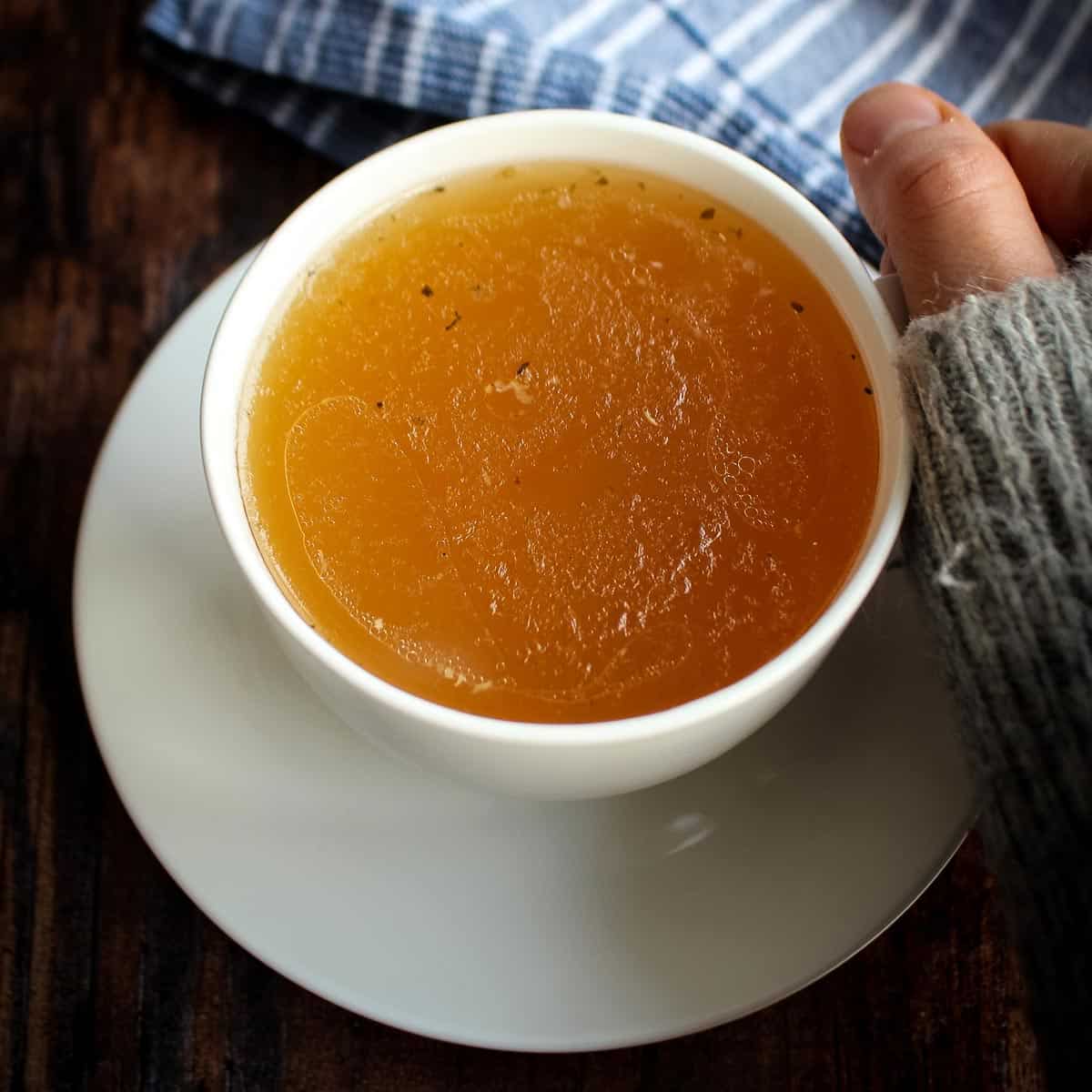Bone Broth for Infants: Soothing Support for Tummy Troubles
Bone Broth for Infants: Soothing Support for Tummy Troubles
Blog Article
The aSignificance of Healthy Food: Why Bone Broth Is an Excellent Choice for Babies
Bone broth stands out as a nutrient-dense option, offering essential vitamins and minerals that sustain development and growth. What are the best means to introduce bone broth to your little one?
Nutritional Perks of Bone Broth for Newborns
When you present bone broth to your baby's diet plan, you're offering a nutrient-dense food that uses numerous health and wellness advantages. Loaded with important minerals and vitamins, bone broth has calcium, magnesium, and phosphorus, which support your baby's expanding bones. It's likewise rich in collagen, assisting in the growth of healthy skin, joints, and connective cells.
Additionally, bone broth is an outstanding source of amino acids like glycine and proline, which play a considerable function in total growth and muscle advancement. These nutrients help advertise a strong immune system, setting a strong foundation for your child's health and wellness.
Furthermore, bone broth is easy to digest, making it a mild alternative for your little one. By integrating this wholesome food into their meals, you're ensuring they obtain crucial nutrients required for their general health. So, go on and make bone broth a staple in your infant's diet!
How Bone Broth Supports Digestion
Bone broth is packed with important nutrients that can truly profit your infant's food digestion. It promotes gut wellness and aids with nutrient absorption, making it a great enhancement to their diet plan. By incorporating bone broth, you're setting the stage for a much healthier digestion system.
Nutrient-Rich Make-up
One of one of the most nutrient-rich foods you can introduce to your infant's diet plan is bone broth, which is packed with vital minerals and amino acids that support healthy and balanced food digestion. Rich in collagen, bone broth helps reinforce your child's intestine lining, making it easier for their body to take in nutrients. It offers jelly, which helps in damaging down healthy proteins, advertising smoother food digestion. Additionally, the broth contains important electrolytes like potassium and magnesium, ensuring your baby remains hydrated and stabilized. The amino acids, such as glycine and proline, play a vital role out of commission tissues and sustaining overall health and wellness (bone broth for infants). By integrating bone broth into your infant's dishes, you're providing them a wholesome food that nurtures their digestion system successfully.
Advertises Intestine Wellness
As you introduce bone broth into your infant's diet, you'll locate it not just nurtures yet additionally promotes intestine health properly. Rich in jelly, bone broth helps relieve the gastrointestinal system, decreasing inflammation and sustaining a healthy intestine lining. This is vital for infants, as a well balanced digestive tract setting lays the foundation for total health. Additionally, the amino acids discovered in bone broth, such as glycine, aid in digestion and can assist protect against typical stomach problems. By integrating this nourishing liquid, you're offering your infant with necessary nutrients that add to a thriving digestive system. Eventually, a healthy intestine can affect everything from immunity to state of mind, making bone broth an outstanding choice for your kid.
Aids Nutrient Absorption
Introducing bone broth not only sustains intestine health however additionally plays a significant duty in helping nutrition absorption. When you provide your infant bone broth, you're offering an abundant resource of minerals and amino acids that improve their gastrointestinal procedures. The gelatin in bone broth assists to relieve the digestive tract cellular lining, boosting its capacity to absorb necessary nutrients. This means that vital vitamins and minerals from various other foods are a lot more effectively used by your baby's expanding body. Furthermore, bone broth consists of collagen, which sustains the growth of healthy cells and body organs. By integrating this nutrient-dense liquid right into your baby's diet regimen, you're guaranteeing they obtain the maximum gain from their dishes, promoting total wellness and wellness.
Strengthening the Immune System With Bone Broth

By integrating bone broth into your infant's diet regimen, you're offering a natural source of sustenance that promotes wellness. Think about making bone broth a staple in your infant's dishes, as it can play a crucial duty in their immune health and wellness and growth.
Easy Ways to Incorporate Bone Broth Into Child's Diet regimen
Incorporating bone broth into your baby's diet can be easy and gratifying. Beginning by mixing a tiny quantity of bone broth into pureed veggies or fruits. This adds flavor and nutrients without frustrating your child. You can likewise use bone broth as a base for soups or stews that you plan for the family members, guaranteeing your child obtains a taste of scrumptious, well balanced meals.
If your child takes pleasure in grains, think about cooking rice or quinoa in bone broth rather of water for added nourishment. These approaches will certainly assist your child gain the advantages of bone broth easily!
Homemade vs. Store-Bought Bone Broth: What to Select
Which is better for your infant: homemade or store-bought bone broth? Self-made bone broth provides you total control over the active ingredients. You can pick top quality bones, organic veggies, and natural herbs, ensuring your child gets the most nutrients without additives or chemicals. And also, making it at home can be a my explanation gratifying experience, allowing you to bond with your baby while preparing wholesome food.
On the various other hand, store-bought options are convenient and save you time. However, they often contain chemicals and may not match the deepness of taste and nutrition you obtain from homemade broth. If you choose for store-bought, try to find brand names that are natural and without additives.
Inevitably, if you have the time and sources, homemade bone broth is the premium option for your child's health. If you're brief promptly, select a quality store-bought choice as a back-up.
Age-Appropriate Bone Broth Offering Pointers
As your baby grows, it's essential to customize bone broth serving suggestions to their developing phase. For infants around 6 months, start with a few does of watered down bone broth (where to get bone broth).
As soon as your infant gets to around 8 months, you can offer it warm in a sippy mug or include it to soft foods like purees. By the time your youngster is around a years of age, consider using bone broth as a standalone beverage or blending it right into soups and stews. Simply ensure to keep the broth low in sodium. Always monitor for any reactions, and consult your pediatrician if you have problems concerning introducing brand-new foods. Appreciate this nutritious enhancement to your baby's diet regimen!
Other Healthy Foods to Couple With Bone Broth for Infants
When you're looking to enhance the dietary worth of bone broth for your baby, consider coupling it with nutrient-dense veggies like carrots and spinach. Whole grain options, such as quinoa or brown rice, can also add texture and fiber. Additionally, incorporating healthy and balanced protein resources like shredded chicken or lentils will complete the dish perfectly.

Nutrient-Dense Vegetables
Nutrient-dense vegetables are a wonderful addition to bone broth for infants, boosting both flavor and nourishment. Incorporating veggies like carrots, spinach, and wonderful potatoes can increase the vitamin and mineral content of your broth. Carrots give beta-carotene for healthy vision, while spinach is loaded with iron and calcium, crucial for growth. Wonderful potatoes include natural sweetness and are rich in fiber, helping digestion.
You can easily blend these vegetables into the broth or offer them as soft, cooked items together with it. This not just introduces new flavors however also encourages your kid to enjoy a range of nutrients. By matching nutrient-dense vegetables with bone broth, you're laying click site the foundation for a healthy and balanced diet regimen right from the start.
Entire Grain Options

Healthy And Balanced Protein Sources
Bone broth sets wonderfully with numerous healthy and balanced protein resources, better boosting your infant's diet regimen. Eggs, when presented securely, are another excellent choice; they're functional and filled with nutrients. By combining these healthy and balanced protein sources with bone broth, you're offering your baby a well balanced, nourishing dish that supports their development and development.
Often Asked Questions
Can Bone Broth Reason Allergies in Newborns?
Yes, bone broth can trigger allergies in babies, particularly if they're delicate to particular components. Always consult your doctor before presenting brand-new foods and screen for any indications of allergic reactions after feeding.
How Should Bone Broth Be Stored for Babies?
You should keep bone broth in impermeable containers, either in the fridge for approximately a week or in the freezer for up to three months. bone broth for pregnancy. Constantly thaw it properly prior to offering to your infant
Is It Safe to Offer Bone Broth to Premature Infants?
It's important to consult your doctor before presenting bone broth to early babies. They'll analyze your baby's specific health and wellness requirements and ensure it's safe, considering their special dietary demands and developmental phase. Always prioritize professional recommendations.
What Are the Indications of Intolerance to Bone Broth in Children?
When presenting bone broth, watch for signs like fussiness, breakout, looseness of the bowels, or vomiting. If your baby shows any one of these responses, it's best to consult a pediatrician prior to proceeding to offer it.
Can Bone Broth Be Used as a Dish Replacement for Newborns?
No, you should not utilize bone broth as a dish replacement for infants. It does not have essential nutrients required for their growth. Instead, incorporate it right into their diet together with balanced dishes for added nutrition and flavor.
Report this page